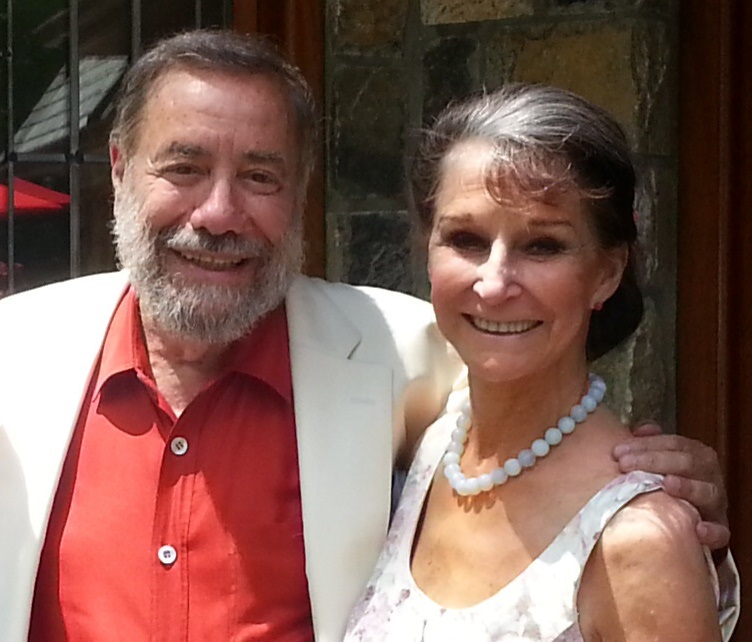Talk to Us
 Andrew and Judith Economos: The Best of Both Worlds
Andrew and Judith Economos: The Best of Both Worlds
By Su Byron
An invisible wall divides the “hard” sciences from the “soft” disciplines of the arts and humanities. They often seem like separate communities, each with its own language. But Andrew and Judith Economos are at home in both domains. They’re leaders in the realm of technology, science, and computer science. Both hold doctorates, and wrote code at the heady days of the digital dawn. In the realm of creativity, they also paint, sculpt, carve and write. On top of all that, they share an entrepreneurial gift. Andrew founded RCS, a game-changing broadcasting software company, which he sold in 2009. Judith played a key role in its growth. But she’s also a poet and artist, who briefly taught philosophy at Princeton University. What brings them here? Andrew grew up in Sarasota, and it captured his heart. When the couple retired, his childhood hometown seemed like the place to do it. But they’re far from retiring—and their commitment to this region is clear. Judith and Andrew founded the Red Tide Institute at Mote Marine Laboratory & Aquarium to find ways to “to eliminate or mitigate” the destructive algal blooms. They’re also proud New College supporters, and recently established the Archimedes Scholars Program. Named in honor of the legendary Greek mathematician and scientist, the scholarship supports students pursuing careers in S.T.E.M. (science, technology, engineering and mathematics) fields. It provides annual scholarships of $10,000 to a New College student, and two $5,000 scholarships to graduates of local high schools, to empower their initial studies in these disciplines. What animates this passion? We recently spoke with Judith. Here’s some of what she shared.
You’ve consistently devoted yourselves to giving back to the community and the planet. Can you point to any philosophical role model that inspired your philanthropy?
Although neither of us is at all religious, we both absorbed the basic principles of charity and compassion from the teachings of Jesus. It is really too bad that so many professed Christians do not regard or practice these simple kindnesses.
S.T.E.M. has been a key priority in your philanthropic giving. You strive to fund scholarships for students pursuing degrees in science, technology, engineering and math. Why is that so essential?
Because the survival of civilization depends heavily on a willingness to seek and accept evidence and to reason carefully. In science and mathematics, you withhold belief until you can rationally justify it to other thinkers; you do not believe something just because you want to believe it—even if you desperately need to believe it!
Some educators advocate adding an “A” for “arts” to the “S.T.E.M.” acronym and making it “S.T.E.A.M.” What do you feel about that?
If people want to include art in their S.T.E.M. curriculum, may they do so and be successful. We’re inclined to think that the strictures of S.T.E.M. thinking might stifle artistic creation, but who knows? Let a hundred flowers bloom!
You launched the Red Tide Institute at Mote Marine Laboratory here in Sarasota. How has the fight against red tide been going?
Last year’s disastrous invasion sparked more efforts to study the phenomenon. We’re happy to see this response; ideally, it won’t dwindle away. Now that there’s sufficient public interest to continue, we hope these investigations will continue. Some good ideas have already emerged, and the clock is ticking. Messing with the environment always has unanticipated consequences.
I understand that you both share a passion for woodcarving. How do you transform a block of raw wood into a figurative form? Do you start with an idea in mind? Or do you find the sculpture in the act of carving?
In woodcarving, it is best to start with a good idea of what you will do; otherwise you can end up with a pile of chips. You can't put back what you cut off. We've also done large outdoor figures cast in bronze, although Florida is not entirely kind to bronze.
You’ve both poured so much time, money, effort and love into New College. How did the college capture your imagination?
Back when the Earth was still cooling, Andrew heard of New College and wanted to enroll there. Unfortunately, it wasn’t quite ready for prime time, so he went to the University of Florida instead. Since we moved to Sarasota, we’ve discovered what a fine and interesting school it is, with a brilliant and charming president, excellent students and an unusually liberal social culture. Even the students’ commencement costumes are, well, creative!
